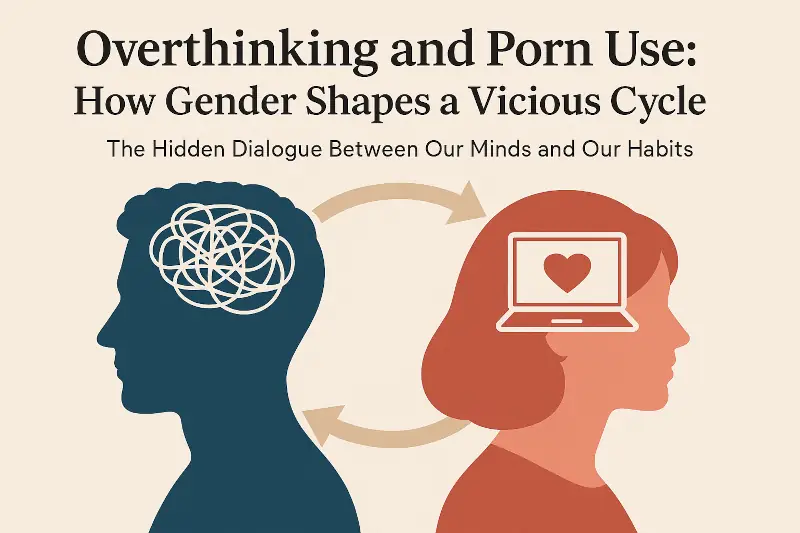Overthinking and Porn Use: How Gender Shapes a Vicious Cycle

The Hidden Dialogue Between Our Minds and Our Habits
The scale of online pornography consumption is immense. In 2023, two of the largest pornography websites, Xvideos and XNXX, had more total visits than TikTok, one of the world’s most popular social media platforms. But beyond the sheer numbers, what is the internal experience of this habit? What is the relationship between porn use and how we think about our lives, our feelings, and ourselves?
New research reveals a surprisingly complex, two-way relationship between what scientists call problematic pornography use (PPU) and “rumination,” or the act of overthinking.
This groundbreaking study shows not only that the behavior can influence our thought patterns, but also that our specific style of thinking can, in turn, either escalate the problem or potentially help us escape it.
Crucially, this connection works very differently for men and women.
First, a Quick Primer: What Are “Problematic Use” and “Rumination”?
Before diving into the findings, let’s clarify the two key concepts. We’re not judging habits, but trying to understanding specific psychological patterns.
What is Problematic Pornography Use (PPU)?
PPU is not defined by how often someone watches pornography. Instead, it is characterized by a loss of control.
The official definition describes it as “poorly controlled, excessive, and/or compulsive engagement in pornography use, accompanied by significant distress and impairments in life,” such as losing a job or damaging relationships.
What is Rumination?
Simply put, rumination is the act of continuously focusing on one’s own negative thoughts and feelings.
However, not all rumination is the same.
Researchers have found that it comes in two distinct flavors: Brooding and Reflection.
Understanding this difference is essential to making sense of the study’s findings.
As professionals, our time is valuable. Dr. Weeks created the Mitigation Aide Research Archive because there isn’t enough focused, data-backed research available in easily digestible formats.

Takeaway 1: Problematic Porn Use Fuels Overthinking But Differently for Men and Women
The study, which followed 2,786 adults over one year, initially found that higher levels of PPU predicted more ruminative thinking (both brooding and reflection) a year later for everyone. This supports the “stress-reactive model,” suggesting the stress, guilt, or life problems from PPU can trigger more repetitive thinking.
However, the researchers dug deeper and uncovered a crucial distinction.
For men, the link was robust: the problematic nature of their use, the loss of control and distress, was a strong predictor of increased rumination down the line, regardless of how frequently they viewed porn.
For women, the story was different.
When researchers statistically controlled for the sheer frequency of pornography use, the link between PPU and later rumination weakened or disappeared entirely.
This suggests that for women, it may be the high frequency of viewing itself, rather than the “problematic” aspect, that is more closely tied to an increase in later overthinking.
Takeaway 2: For Women, Brooding Can Create a Vicious Cycle
When researchers looked at how thinking patterns affected behavior over time, a key gender difference emerged. For women, a specific type of rumination, brooding, was linked to an increase in problematic use down the line. The study found that higher levels of brooding at the start were associated with higher levels of PPU one year later.
Brooding is generally regarded as a more maladaptive form of rumination, which is defined as:
Adopting a passive and introspective demeanor that evaluates current circumstances against an unrealized, idealized standard, accompanied by a sense of regret and dissatisfaction.
This passive, self-critical style is captured in the very questions researchers used to measure it. Such as:
- “Why do I always react this way?”
- “Why can’t I handle things better?“
According to the cognitive-behavioral model, this style of thinking can exacerbate negative emotions like anxiety and stress. Women may then engage in the problematic behavior to cope with these painful feelings. Thus, creating a dangerous feedback loop where the thinking pattern fuels the habit that causes the distress.
Takeaway 3: For Men, Reflective Thinking May Act as a Protective Shield
The most counter-intuitive finding came from the data on men. For them, a different type of rumination—reflection—appeared to be a protective factor.
The study revealed that higher levels of reflective thinking at the start were associated with lower levels of PPU a year later. Reflection is seen as a more adaptive and constructive form of thinking. Its scientific definition is:
Reflection, a purposeful and active cognitive process, involves accepting and understanding distress and feelings to engage in effective coping mechanisms.

Do you believe your sexual behaviors are compulsive or harmful to you or others? Then you should take the CSBD-19 free, validated self-assessment tool.
Why would this type of overthinking be helpful in relation to Porn Use?
The researchers hypothesize that because men report higher rates of PPU and its negative consequences, they may become more motivated to fix the problem. This motivation could trigger a more problem-solving style of thought.
As the researchers suggest, “men may be motivated to disrupt this pattern and regain control over their problematic behavior… Such a response could potentially be associated with engaging in a more problem-solving-focused type of rumination (i.e., reflective rumination), resulting in reduced PPU.”
Conclusion: It’s Not That You Think, But How You Think
The relationship between porn use and our thought patterns is not simple. This research shows that it is a complex, bidirectional cycle that differs significantly by gender. For both men and women, pornography use can be linked to more negative, repetitive thinking.
But the reverse is where the crucial distinction lies.
For women, a passive, self-critical “brooding” can trap them in a cycle, making the problem worse.
For men, an active, problem-solving “reflection” may be a key to breaking free.
The ultimate takeaway is that when it comes to the link between our thoughts and our habits, it may not be that you think, but how you think that truly matters.
This leaves us with a powerful, forward-looking question: If the way we reflect on our behaviors can either trap us in a cycle or help us break free, what does that mean for our ability to consciously change our habits?

Are you a professional looking to stay up-to-date with the latest information on, sex addiction, trauma, and mental health news and research? Or maybe you’re looking for continuing education courses? Then you should stay up-to-date with all of Dr. Jen’s work through her practice’s newsletter!
Do you feel your sexual behavior, or that of someone you love, is out of control? Then you should consult with a professional.


Have you found yourself in legal trouble due to your sexual behavior? Seek assistance before the court mandates it, with Sexual Addiction Treatment Services.
Are you a Licensed Professional Counselor seeking engaging, unique Continuing Education courses? Dr. Weeks offers accredited courses on her practice website on the effects of Pornography Abstinence and other unique topics!

